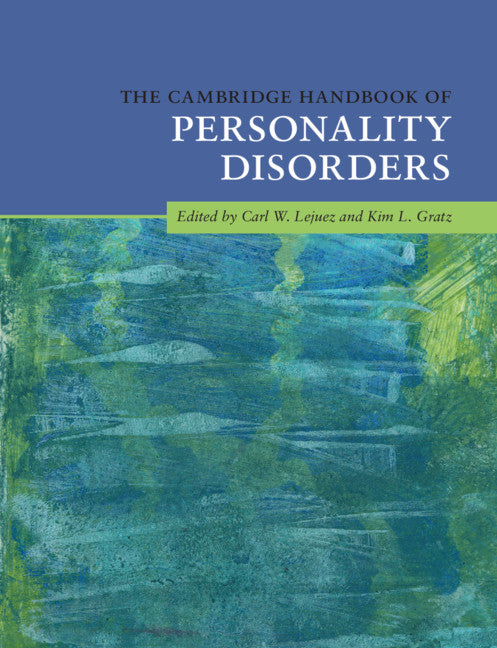Freshly Printed - allow 4 days lead
Couldn't load pickup availability
The Cambridge Handbook of Personality Disorders
An essential resource for understanding the rapidly evolving field of personality disorders for researchers and clinicians.
Carl W. Lejuez (Edited by), Kim L. Gratz (Edited by)
9781108424349, Cambridge University Press
Hardback, published 7 May 2020
552 pages, 17 b/w illus. 24 tables
28.4 x 22 x 3.1 cm, 1.53 kg
'… a must-have for practitioners in the mental health field … this handbook provides in-depth analysis of the etiology and treatment of challenging disorders … is a well-documented look at personality disorders that anticipates potential or ongoing controversies about their etiology, diagnosis, or treatment.' R. E. Osborne, Choice
This Handbook provides both breadth and depth regarding current approaches to the understanding, assessment, and treatment of personality disorders. The five parts of the book address etiology; models; individual disorders and clusters; assessment; and treatment. A comprehensive picture of personality pathology is supplied that acknowledges the contributions and missteps of the past, identifies the crucial questions of the present, and sets a course for the future. It also follows the changes the Diagnostic and Statistical Manual of Mental Disorders (DSM–5) has triggered in the field of personality disorders. The editors take a unique approach where all chapters include two commentaries by experts in the field, as well as an author rejoinder. This approach engages multiple perspectives and an exchange of ideas. It is the ideal resource for researchers and treatment providers at all career stages.
List of figures
List of tables
List of contributors
Introduction to the Cambridge Handbook of Personality Disorders Carl W. Lejuez and Kim L. Gratz
Part I. Etiology: 1. Neuroimaging in personality disorders Chi C. Chan, Daniel H. Vaccaro, Nina L. J. Rose, Laura E. Kessler and Erin A. Hazlett
2. Issues and new directions in personality disorder genetics Kerry L. Jang and Fiona Choi
3. Environmental and sociocultural influences on personality disorders Brianna J. Turner, Julie Prud'homme and Nicole Legg
4. Personality pathology in youth Carla Sharp and Barbara De Clercq
Part II. Models: 5. Controversies in the classification and diagnosis of personality disorders Joel Paris
6. Categorical models of personality disorders Igor Weinberg
7. The five-factor model of personality disorders Joshua D. Miller and Thomas A. Widiger
8. Interpersonal models of personality pathology Michael J. Roche and Emily B. Ansell
Part III. Individual Disorders and Clusters: 9. Cluster a personality disorders John G. Kerns
10. Borderline personality disorder Alexander L. Chapman, Nora H. Hope and Brianna J. Turner
11. An integrative biobehavioral trait perspective on antisocial personality disorder and psychopathy Sarah J. Brislin and Christopher J. Patrick
12. Narcissistic and histrionic personality disorders Aaron L. Pincus, Sindes Dawood, Leila Z. Wu and Chloe F. Bliton
13. Cluster C anxious-fearful personality pathology and avoidance Charles A. Sanislow and Anna Darre Hector
Part IV. Assessment: 14. Methods and current issues in dimensional assessments of personality pathology Chloe M. Evans, Trevor F. Williams and Leonard J. Simms
15. Categorical assessment of personality disorders: considerations of reliability and validity Janine D. Flory
16. Assessment of mechanisms in personality disorders Sheila E. Crowell, Parisa R. Kaliush and Robert D. Vlisides-Henry
Part V. Treatment: 17. Cognitive behavioral approaches M. Zachary Rosenthal, Kristin P. Wyatt and Kibby McMahon
18. Psychoanalytic/psychodynamic approaches to personality disorders Peter Fonagy, Anthony Bateman, Patrick Luyten, Elizabeth Allison and Chloe Campbell
19. Using DSM-5 and ICD-11 personality traits in clinical treatment Bo Bach and Jennifer Presnall-Shvorin
20. Brief therapeutic approaches for personality disorders Katherine L. Dixon-Gordon, Lindsey C. Conkey and Sherry E. Woods
21. Recent developments in the pharmacologic management of personality disorders Paul S. Links, Philippe Boursiquot and Madison Links
Index.
Subject Areas: Medical counselling [MQU], Clinical psychology [MMJ], Psychiatry [MMH], Health psychology [MBNH9], The self, ego, identity, personality [JMS], Social work [JKSN]


